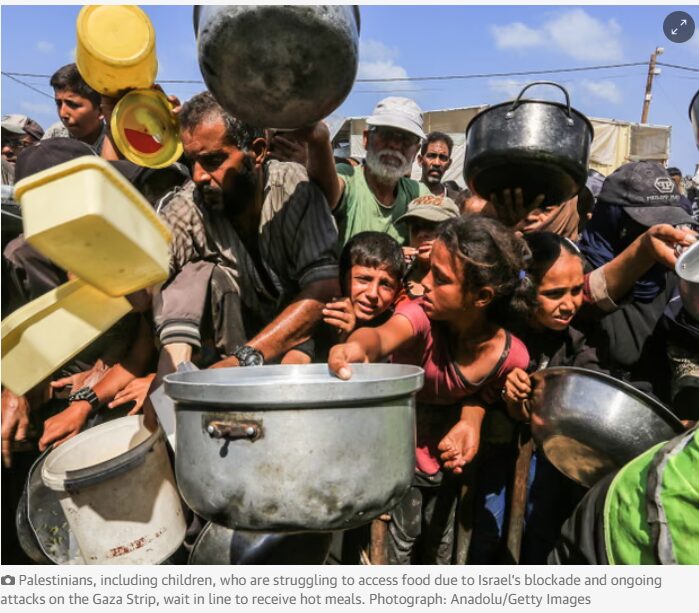The humanitarian crisis in Gaza has entered a devastating new phase. A United Nations–linked investigation has concluded that Israeli restrictions on humanitarian aid deliveries have significantly contributed to a famine now unfolding in Gaza City and surrounding areas. According to the Integrated Food Security Phase Classification (IPC), famine conditions are already affecting more than half a million people, with the numbers projected to rise steeply by September if urgent action is not taken.
This conclusion is not only a technical assessment but also a political flashpoint. The report states that deliberate obstruction of aid routes and disruption of food supply chains may amount to the use of starvation as a weapon of war, an act considered a potential war crime under international law. Human rights groups including Oxfam and Mercy Corps have echoed the findings, saying the evidence points to a systematic pattern of blocking or delaying aid convoys that has crippled Gaza’s already fragile food distribution system.
The Collapse of Food Security
Rice, flour, and staple goods are now nearly impossible to access for many families in Gaza. Malnutrition among children is surging at an alarming rate, with hospitals reporting increasing numbers of cases of acute hunger. Aid workers describe scenes of desperate parents bringing malnourished children to clinics that lack basic medicine and even clean water. The World Food Programme has warned that the humanitarian system is buckling under the weight of both political restrictions and ongoing conflict, with Gaza now facing one of the most severe hunger crises in recent decades.
Local reports highlight the daily chaos around aid distribution points. Trucks carrying food and medical supplies face lengthy inspection delays or are denied entry altogether, leaving stockpiles to rot on the wrong side of the border. In some cases, convoys that manage to enter Gaza are looted by armed groups or mobbed by desperate crowds, underlining the collapse of law and order that accompanies famine conditions.
Israel’s Response
The Israeli government has categorically rejected the accusations, describing the UN’s findings as biased and politically motivated. Officials insist that humanitarian aid continues to enter Gaza daily and argue that Hamas is the real cause of the crisis, accusing the militant group of seizing supplies and exploiting aid routes to smuggle weapons. From Israel’s perspective, the restrictions are a necessary security measure in the face of ongoing attacks and threats from Gaza.
Yet, humanitarian organizations dispute this narrative, pointing to multiple independent assessments that show aid levels remain grossly insufficient. Critics argue that regardless of Hamas’s actions, international law requires Israel, as the occupying power, to ensure that civilian populations have access to food, water, and medical care.
International Reaction
The findings of the UN-linked investigation have reignited international condemnation. Global leaders, including those in Europe and the Middle East, have called on Israel to immediately lift restrictions and guarantee unfettered humanitarian access. Protests have erupted in major cities worldwide, with demonstrators demanding accountability and urging governments to pressure Israel through diplomatic or economic measures.
The United States and other allies of Israel face renewed scrutiny over their role in the crisis. Critics argue that continued military and political support indirectly enables policies that exacerbate civilian suffering. At the same time, policymakers in Washington and Brussels remain divided on how forcefully to confront Israel without destabilizing broader geopolitical alliances.
The Broader Implications
This crisis highlights a troubling trend: the weaponization of food in modern conflicts. Throughout history, famine has been used as a tool of control and coercion, and the Gaza case adds to a growing list of examples where civilians bear the brunt of political and military struggles. Legal experts warn that if the UN’s classification of the crisis as a famine caused by human actions is confirmed, individuals and states could face accountability under international humanitarian law.
The Gaza famine also exposes the fragility of global humanitarian systems. Despite the presence of international aid agencies, political blockades and military strategies have proven capable of paralyzing relief operations. This raises urgent questions about how the international community can enforce humanitarian norms in conflicts where powerful states or actors choose to defy them.
Looking Ahead
Without immediate intervention, the famine in Gaza is expected to deepen in the coming weeks. Over half a million people are already experiencing catastrophic food insecurity, and the numbers could rise to nearly one million if access continues to be restricted. The crisis has become a test case for the enforcement of international law and the global community’s willingness to hold actors accountable for the deliberate infliction of civilian suffering.
For families inside Gaza, however, these geopolitical debates provide little relief. Each day is a struggle for survival, marked by empty shelves, failing hospitals, and the haunting reality of children going to bed hungry. Whether the world responds decisively or continues with half-measures will determine not only the future of Gaza but also the credibility of international commitments to protect civilians in war.

